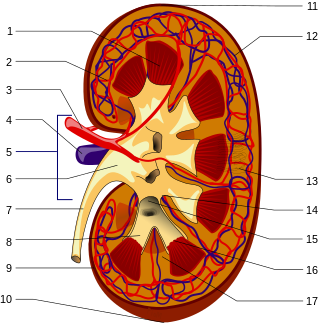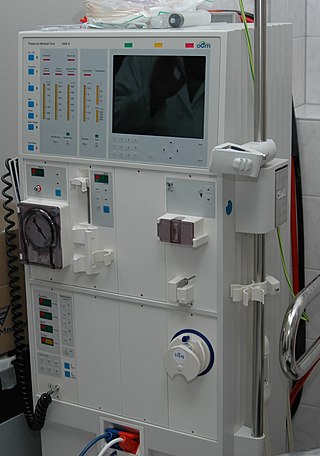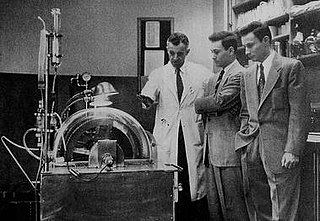
Nephrology is a specialty of adult internal medicine and pediatric medicine that concerns the study of the kidneys, specifically normal kidney function and kidney disease, the preservation of kidney health, and the treatment of kidney disease, from diet and medication to renal replacement therapy. The word “renal” is an adjective meaning “relating to the kidneys”, and its roots are French or late Latin. Whereas according to some opinions, "renal" and "nephro" should be replaced with "kidney" in scientific writings such as "kidney medicine" or "kidney replacement therapy", other experts have advocated preserving the use of renal and nephro as appropriate including in "nephrology" and "renal replacement therapy", respectively.

Kidney failure, also known as end-stage kidney disease, is a medical condition in which the kidneys can no longer adequately filter waste products from the blood, functioning at less than 15% of normal levels. Kidney failure is classified as either acute kidney failure, which develops rapidly and may resolve; and chronic kidney failure, which develops slowly and can often be irreversible. Symptoms may include leg swelling, feeling tired, vomiting, loss of appetite, and confusion. Complications of acute and chronic failure include uremia, high blood potassium, and volume overload. Complications of chronic failure also include heart disease, high blood pressure, and anemia.

Chronic kidney disease (CKD) is a type of kidney disease in which a gradual loss of kidney function occurs over a period of months to years. Initially generally no symptoms are seen, but later symptoms may include leg swelling, feeling tired, vomiting, loss of appetite, and confusion. Complications can relate to hormonal dysfunction of the kidneys and include high blood pressure, bone disease, and anemia. Additionally CKD patients have markedly increased cardiovascular complications with increased risks of death and hospitalization.

Metabolic acidosis is a serious electrolyte disorder characterized by an imbalance in the body's acid-base balance. Metabolic acidosis has three main root causes: increased acid production, loss of bicarbonate, and a reduced ability of the kidneys to excrete excess acids. Metabolic acidosis can lead to acidemia, which is defined as arterial blood pH that is lower than 7.35. Acidemia and acidosis are not mutually exclusive – pH and hydrogen ion concentrations also depend on the coexistence of other acid-base disorders; therefore, pH levels in people with metabolic acidosis can range from low to high.
Renal osteodystrophy/adynamic bone disease is currently defined as an alteration of bone morphology in patients with chronic kidney disease (CKD). It is one measure of the skeletal component of the systemic disorder of chronic kidney disease-mineral and bone disorder (CKD-MBD). The term "renal osteodystrophy" was coined in 1943, 60 years after an association was identified between bone disease and kidney failure.
The Kolling Institute is located in the grounds of the Royal North Shore Hospital in St Leonards, Sydney Australia. The institute, founded in 1920, is the oldest medical research institute in New South Wales.

Robert Provenzano is an American nephrologist. He is also an Associate Clinical Professor of Medicine at Wayne State University School of Medicine.
Nathan W. Levin is an American physician and founder of the Renal Research Institute, LLC., a research institute dedicated to improving the outcomes of patients with kidney disease, particularly those requiring dialysis. Levin is one of the most prominent and renowned figures in clinical nephrology as well as nephrology research. He has authored multiple book chapters and over 350 peer-reviewed publications, including articles in leading journals such as Nature, the New England Journal of Medicine, and The Lancet.

John Putnam Merrill was an American physician and medical researcher. He led the team which performed the world's first successful kidney transplant. He generally credited as the "father of nephrology" or "the founder of nephrology," which is the scientific study of the kidney and its diseases.
Kamyar Kalantar-Zadeh is an Iranian-American physician doing research in nephrology, kidney dialysis, nutrition, and epidemiology. He is best known as a specialist in kidney disease nutrition and chronic kidney disease and for his hypothesis about the longevity of individuals with chronic disease states, also known as reverse epidemiology including obesity paradox. According to this hypothesis, obesity or hypercholesterolemia may counterintuitively be protective and associated with greater survival in certain groups of people, such as elderly individuals, dialysis patients, or those with chronic disease states and wasting syndrome (cachexia), whereas normal to low body mass index or normal values of serum cholesterol may be detrimental and associated with worse mortality. Kalantar-Zadeh is also known for his expertise in kidney dialysis therapy, including incremental dialysis, as well as renal nutrition. He is the brother of Kourosh Kalantar-zadeh, who an Australian scientist involved in research in the fields of materials sciences, nanotechnology, and transducers.
Ronald Jonathan Falk, MD, FACP, FASN is the Nan and Hugh Cullman Eminent Professor and Chair of the Department of Medicine at the University of North Carolina-Chapel Hill (UNC). He is a clinical nephrologist and internationally recognized expert in anti-neutrophil cytoplasmic autoantibody (ANCA)-induced vasculitis and autoimmune kidney disease. His career as a translational physician-scientist spans more than three decades. His clinical practice and translational research focus on characterizing the cell, tissue and physiologic changes in the development of specific autoimmune kidney diseases and developing new approaches for studying autoimmunity, inflammation and basic neutrophil/monocyte biology. He was Chief of the UNC Division of Nephrology and Hypertension from 1993-2015. He co-founded the UNC Kidney Center in 2005 and continues as Co-Director. Falk is a Past-President of the American Society of Nephrology (ASN). Since 2015, he has served as Chair of the Department of Medicine at UNC.

Carmine Zoccali is an Italian nephrologist and a clinical investigator. He has contributed to research in several fields, most notably hypertension and cardiovascular complications in chronic kidney disease (CKD), CKD progression and clinical epidemiology of kidney diseases at large. He is known for his studies on cardiovascular risk in CKD and dialysis patients. He was among the earliest investigators that focused on the relevance of endothelial dysfunction and inflammation for the high risk of cardiovascular disease in these populations. In this research area, he was the first to link endogenous inhibitors of the nitric oxide system with death and cardiovascular disease. and the first to document a relationship between sympathetic over-activity and these outcomes Dr Zoccali is a practicing specialist in Nephrology, with a national qualification for the full professorship in Nephrology. He is also a specialist in hypertension, certified by the European Society of Hypertension (ESH).
Isidro B. Salusky is an American nephrologist.
Sucroferric oxyhydroxide, sold under the brand name Velphoro, is a non-calcium, iron-based phosphate binder used for the control of serum phosphorus levels in adults with chronic kidney disease (CKD) on haemodialysis (HD) or peritoneal dialysis (PD). It is used in form of chewable tablets.
Sharon A. Anderson is an American physician, educator, and researcher practicing in Portland, Oregon. She has contributed extensively to the study of the progression of chronic kidney disease. Her research has focused on diabetic nephropathy, polycystic kidney disease and the pathophysiology of the aging kidney. She was the first woman to serve as President of the American Society of Nephrology (ASN). She was the Chief of the Department of Medicine at the Veteran's Affairs Medical Center in Portland and is currently the Chair of the Department of Medicine at Oregon Health and Science University (OHSU). She has been appointed to the National Institutes of Health Council of Councils. Her publications as author or co-author number greater than 150.
Vlado Perkovic is an Australian renal physician and researcher who is the Dean of the Faculty of Medicine at the University of New South Wales, Sydney.

Jochen Reiser is a physician-scientist and a healthcare leader. He is the Ralph C Brown MD Professor and the Chairman of Medicine at Rush University Medical Center. Dr. Reiser's research has provided important mechanistic insights into the molecular pathogenesis of kidney diseases. Dr. Reiser discovered the role of suPAR as a global, circulating risk factor for chronic kidney disease (CKD) as well as for acute kidney injury (AKI). suPAR is investigated as potential causative agent contributing to many kidney diseases including focal segmental glomerulosclerosis (FSGS). These studies have broad clinical significance and lay the foundation for creation of novel diagnostics and pharmaco-therapeutics with potential benefit for a large patient population. His studies on suPAR molecule were featured in Science in 2018. Dr. Reiser has been an advocate of science and innovation for two decades and was named as an inventor on multiple patents. He is co-founder of Cambridge, MA-based Walden Biosciences, an ARCH Venture Partners joint-venture biopharmaceutical portfolio company dedicated to develop first-in-class therapeutics for kidney diseases.

Andrew S. Levey is an American nephrologist who transformed chronic kidney disease (CKD) clinical practice, research, and public health by developing equations to estimate glomerular filtration rate (GFR), and leading the global standardization of CKD definition and staging.
Samira Farouk, MD, MS, FASN is a board-certified transplant nephrologist and Associate Professor of Medicine and Medical Education at Icahn School of Medicine at Mount Sinai (ISMMS). She teaches medical students, residents, and fellows, and also develops and studies innovations in medical education. Her clinical research interests include the pathogenesis of kidney fibrosis in regards to transplant survival and chronic kidney diseases. Farouk is also cofounder of the free mobile-friendly nephrology teaching tool NephSIM, Associate Program Director of the Nephrology Fellowship at ISMMS, and Director of Mentoring and Trainee Engagement of KIDNEYcon.
Rulan S. Parekh is an American-Canadian clinician-scientist and nephrologist. She is the vice president of research, education and innovation at Women's College Hospital and former senior scientist in Child Health Evaluative Sciences and Associate Chief of Clinical Research at SickKids.








